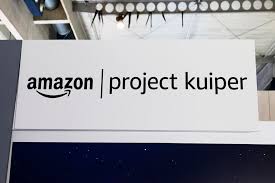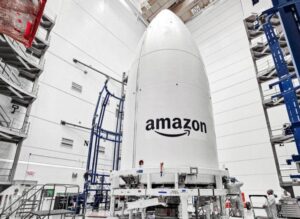In a race to establish a global communications network from space, Amazon has successfully launched its first prototype satellites as part of Project Kuiper. This project aims to create a constellation of over 3,200 satellites that will provide internet service from orbit, competing with SpaceX’s Starlink service. The two satellites were launched on an Atlas V rocket at Cape Canaveral Space Force Station in Florida, marking Amazon’s first foray into space. This article explores Amazon’s entry into the space industry and its plans to revolutionize internet connectivity from above.
Overview of Project Kuiper
Introduction to Project Kuiper
Project Kuiper is a new venture by Amazon to provide internet service from orbit through a planned megaconstellation consisting of more than 3,200 satellites. It aims to compete with SpaceX’s Starlink service and revolutionize internet connectivity worldwide.
Purpose of Project Kuiper
The purpose of Project Kuiper is to bring high-speed internet access to underserved areas around the globe. By deploying a fleet of satellites in low Earth orbit, Amazon hopes to bridge the digital divide and enable people in remote regions to access crucial online resources.

Comparison to SpaceX’s Starlink service
Project Kuiper will directly compete with SpaceX’s Starlink service, which has already made significant progress in the field of satellite internet connectivity. Both initiatives aim to provide global coverage and offer improved internet access to users around the world.
Launch of Prototype Satellites
Launch Details
Two prototype satellites for Project Kuiper were successfully launched from Cape Canaveral Space Force Station in Florida. The launch took place on an Atlas V rocket and marked Amazon’s first foray into space.
Rocket Used for Launch
The Atlas V rocket, provided by United Launch Alliance, was chosen to carry the two prototype satellites to orbit. United Launch Alliance confirmed the success of the launch, indicating that the satellites were delivered to the intended orbit.

Successful Deployment to Orbit
Shortly after the launch, Amazon announced that it had established contact with both satellites in orbit. The satellites will undergo further testing and the necessary adjustments before they can begin beaming internet connections to the ground.
Initial Contact and Testing
Contact with Satellites
Less than an hour after the launch, Amazon confirmed that it had made contact with both satellites in orbit. This initial contact is a crucial milestone in the mission, as it allows for further communication and monitoring of the satellites’ performance.
Testing of Systems
After the deployment of solar panels and initial contact, the satellites will undergo extensive testing of their systems. These tests will ensure that all components and functionalities are working as intended and prepare the satellites for their mission of providing internet connectivity.
Internet Connection Testing
One of the primary goals of Project Kuiper is to provide internet access from space. During the testing phase, the satellites will focus on establishing high-speed, reliable internet connections and transmitting data to the ground. These tests will help refine the system and ensure its effectiveness.
Learning Opportunities from Mission
Amazon’s First Space Mission
Project Kuiper marks Amazon’s first venture into space missions. Regardless of the mission’s outcome, Amazon stands to gain valuable experience and knowledge from this endeavor, which can be applied to future projects and advancements in the space industry.
Gaining Knowledge Regardless of Mission Outcome
The success of Project Kuiper will undoubtedly bring significant benefits to Amazon and its users. However, even if the mission faces challenges or setbacks, the lessons learned throughout the process will be invaluable in shaping future space technology and improving internet connectivity worldwide.
Technological Advancements
Project Kuiper represents a significant step forward in satellite-based internet connectivity. Through this mission, Amazon has the opportunity to develop and refine cutting-edge technologies such as satellite communication systems, solar panel deployment mechanisms, and other components essential to the success of the project.
Delay in Blue Origin’s Rocket Launch
Blue Origin’s Rocket Development Timeline
Blue Origin, Jeff Bezos’s rocket company, has faced delays in the development of its New Glenn rocket. While Blue Origin has successfully launched its suborbital space tourist rocket, New Shepard, the New Glenn rocket designed for commercial payload launches has faced setbacks, pushing its debut flight to next year.
New Glenn’s Impact on Project Kuiper
Amazon’s decision to use the Atlas V rocket for the launch of Project Kuiper’s prototype satellites was influenced by the delay in the development of Blue Origin’s New Glenn rocket. By switching to the Atlas V, Amazon ensures that the project does not face unnecessary delays and can continue on schedule.
Switch from Vulcan to Atlas V
In August, Amazon announced a switch from the Vulcan rocket to the Atlas V for the launch of Project Kuiper’s prototype satellites. The decision was made due to the Vulcan experiencing a setback during a test, requiring additional time for fixes. The switch to the reliable Atlas V ensures a smooth and timely launch for Project Kuiper.
Schedule and Expectations for Kuiper Launches
Approval by Federal Communications Commission
Amazon’s Project Kuiper received approval from the Federal Communications Commission (FCC) in 2020. The FCC imposed deadlines for Amazon to launch at least half of its 3,236 satellites by July 2026, with the full constellation to be deployed by July 2029. Meeting these deadlines is crucial for the success of Project Kuiper.
Deadlines for Satellite Deployment
To meet the FCC’s deadlines, Project Kuiper must adhere to a strict schedule for the deployment of its satellites. Each launch is essential in expanding the constellation and bringing internet connectivity to more areas around the world. Delays in satellite deployment could impact the project’s goals and objectives.
Confidence in Meeting Schedule
Officials at Blue Origin, Arianespace, and United Launch Alliance, the companies involved in Project Kuiper’s satellite launches, express confidence in meeting the project’s schedule. While challenges can arise in any space mission, the collective expertise and commitment of these companies provide assurance that Project Kuiper will stay on track.
Lawsuit Over Launch Contracts
Lawsuit Filed Against Amazon
In August, a pension fund that owns Amazon stock filed a lawsuit against Amazon, alleging that the company did not purchase any launches from SpaceX, a competitor to its Starlink service. The lawsuit claims that Amazon’s board did not take sufficient actions to prevent conflicts of interest arising from Jeff Bezos’s ownership of Blue Origin and his position as Amazon’s CEO at the time.
Allegations of Conflict of Interest
The lawsuit suggests that Jeff Bezos had the opportunity to negotiate launch contracts for Amazon while simultaneously negotiating against Amazon on behalf of Blue Origin. The conflict of interest allegations raise questions about the fairness and transparency of the launch contracts awarded by Amazon for Project Kuiper.
Amazon’s Response to Lawsuit
Amazon has responded to the lawsuit, stating that the claims are without merit. The company is confident that it can address the allegations through the legal process. Amazon remains committed to its mission of expanding internet connectivity and believes that Project Kuiper will bring significant benefits to users worldwide.
Animosity Between Bezos and Musk
Background on Bezos and Musk Rivalry
There has been a long-standing rivalry between Jeff Bezos, the founder of Amazon and Blue Origin, and Elon Musk, the founder and CEO of SpaceX. The competition between these two billionaire entrepreneurs extends beyond their respective space ventures and encompasses various industries and business strategies.
Excluding SpaceX from Launch Process
The lawsuit filed against Amazon highlights the alleged exclusion of SpaceX from the launch contracts awarded for Project Kuiper. The bitter rivalry between Bezos and Musk may have influenced Amazon’s decision-making process, leading to the omission of SpaceX, one of the leading players in the satellite internet market.
Impact on Amazon’s Satellite Launches
The preference for excluding SpaceX from the launch process could have implications for Amazon’s satellite launches. SpaceX’s Starlink service has gained significant momentum and holds a strong market position. The exclusion of SpaceX from Project Kuiper could impact the competitiveness and overall success of Amazon’s satellite internet service.
Conclusion and Closing Remarks
In conclusion, Project Kuiper represents Amazon’s ambitious endeavor to bring high-speed internet access to underserved areas through a constellation of thousands of satellites. The successful launch of prototype satellites marks a significant milestone for the project, and Amazon is poised to gain valuable knowledge and experience regardless of the mission’s outcome.
While facing delays in Blue Origin’s rocket development and ongoing legal challenges, Amazon remains confident in meeting the deadlines and delivering on its promise of global internet connectivity. The rivalry between Jeff Bezos and Elon Musk adds a unique dynamic to the competition in the satellite internet market, and its impact on Amazon’s satellite launches remains to be seen.
As Project Kuiper progresses, the world eagerly awaits the realization of its potential to revolutionize internet connectivity and bridge the digital divide. Through collaboration, technological advancements, and a commitment to providing accessible and reliable internet access, Project Kuiper aims to change the way we connect and communicate in the digital age.

